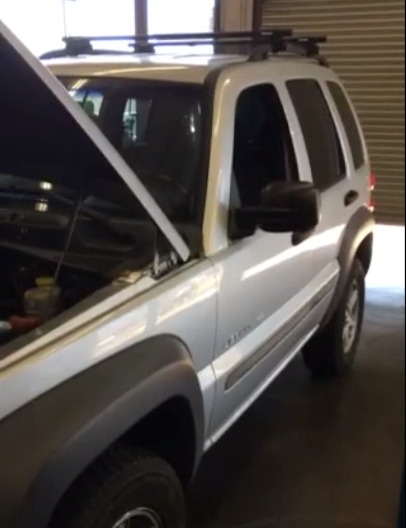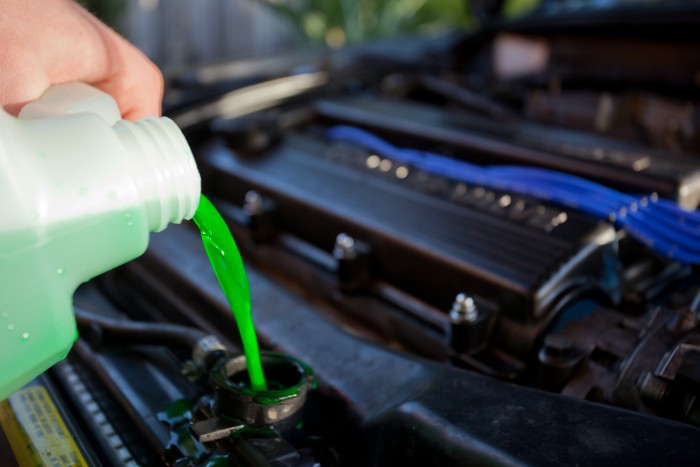Posted on 1/26/2015

Have you ever had a car that ran low on coolant? Or perhaps a car that overheated without warning? Coolant leaks are an indicator of a serious problem in any car. In this video, we see a 2002 Jeep Liberty that was constantly running low on coolant. The owners never saw any leaking on the ground, so they were stumped. They brought the Jeep into Convoy Auto Repair to see what the problem was, and we discovered there was indeed a leak - just not where they thought! Coolant works together with the car's radiator to make sure the engine doesn't get too hot. Overheating can damage an engine to the point that's it's unusable, especially if you keep driving when it's overheating. The water pump, fan, and serpentine belts are crucial components of your engine that allow it to function properly in rough terrain (such as going up the mountains on ... read more
Posted on 1/22/2014

It’s common knowledge that you need to change your oil regularly to keep your car running well. Did you know you also need to change your coolant? In the past, car owners would change their anti-freeze every fall, making sure they were ready for the colder winter months (well... maybe not in San Diego!). Modern coolant doesn’t need to be changed quite that often, but it does still lose its effectiveness over time, and flushing coolant will remove buildup, if you have it. Image: Wikipedia Coolant/anti-freeze does two things for your vehicle. It prevents the water from boiling out as it moves through special chambers through the engine, into the radiator and back again and it prevents the water from freezing inside those chambers when the temperatures get low. The chemicals that make up coolant break down ... read more
Posted on 7/18/2012

Drivers rely on their car's coolant system to keep their engine cool. Coolant (also called antifreeze) mixed with water flows through your sedan engine and absorbs heat. The mixture then flows out to the radiator where it’s cooled by air flowing over the radiator. From there the coolant/water mix circulates back through the engine to absorb more heat. There’s a reason we mix coolant and water. Water alone actually does a good job transferring heat from the engine. The problem is that water boils at a temperature that’s easily reached inside your sedan's engine, so it can turn to steam which does not conduct heat as well and is harder to contain. Also, if it’s freezing outside in San Diego, the water in your engine could freeze while your vehicle is sitting out in the cold. So, if you remember your high school chemistry, you’ll know that a mixture has both a higher boiling point and a lower freezing point than either component alone. Coolant, o ... read more
Posted on 5/22/2012

The cooling system keeps our engine from overheating while you are driving around San Diego CA. Its job is to move heat away from the engine. Let's talk about the various components of the system and how they work to accomplish this. The radiator is the part most everyone associates with the cooling system. Coolant flows through the radiator which has fine cooling fins that draw the heat out of the coolant and dissipate it into the air. To make sure there's enough airflow over the radiator, a fan pulls air over the cooling fins even when the car is idling. In some vehicles, the fan is powered by the serpentine belt. On others, an electric motor runs the fan. Electric fans turn on and off as needed. You may have heard the fan kick on shortly after you turn your car off. The sensor has determined that the engine needs a little help cooling down to a safe temperature. A hose connects the radiator to the water pump. The ... read more
Posted on 9/2/2011
Your cooling system is very important. It circulates coolant through the radiator and your engine to protect your car from overheating. There are five main components to the cooling system: The water pump's like the heart of your cooling system, circulating the fluid throughout. It's a small pump that's driven by the engine; usually by belt, but sometimes by a chain or gear. The water pump only operates when the engine's running. Water pump failure is pretty routine. Some start failing at around 40,000 miles, but most fail by 100,000 miles. Consult your owners' manual or service technician to see what's recommended. Since a water pump either works or it doesn't, you need to change it when it fails. Water pumps fail in one of two ways: the bearings fail or they begin to leak. It's possible to have a leak from a cracked water pump, but it usually leaks at the gasket where it attaches to the engine. So how can you tell when the water pump is failing? If you can hear a low-pitched grindi ... read more
Posted on 10/7/2010
Today we want to talk about a very important system in our cars – the cooling system. It’s one of those things that you don’t give much thought to until it fails and then you’re stranded by the side of the road. Cooling systems fail more often than any other mechanical system – usually because of neglect. Don’t you hate it when something breaks, and you could have done something to prevent it? The good news is that if you take care of your cooling system it can keep working for the life of your car. Here at AutoNetTV, we emphasize preventive maintenance services like replacing your coolant according to the factory schedule. But the various parts that make up the cooling system need attention too. The major components of the cooling system are the water pump, freeze plugs, the thermostat, the radiator, cooling fans, the heater core, the pressure cap, the overflow tank and the hoses. It sounds complicated, but we don’t have to be experts – we can le ... read more
Posted on 7/28/2010
You may know that most automotive failures are tire related, but do you know the second most common cause for vehicle failure? Nope, it's not teenagers. It is the coolant system. But, if you take good care of your coolant system, it will take good care of you. A car's engine creates a lot of heat - so much heat, that if it is not properly cooled, the engine can lock up, resulting in massive damage and repair bills. But when everything is working right, your engine operates at the proper temperature and all is well. Without antifreeze in your cooling system, the water could freeze and cause engine damage. This could be very expensive, not to mention inconvenient. The right mix of water and antifreeze protects the engine against damage from freezing and overheating. Antifreeze also protects the coolant system against corrosion that could cause the system to fail. The thing to remember is this: coolant system failure is very common, but it is also very easy to prevent. Service technician ... read more
Posted on 12/8/2009
The coolant system is a vital part of your vehicle. It is also the second most common cause for vehicle failures. Even though coolant system failure is fairly common, it is easy to prevent with radiator service. The most recognizable part of the coolant system is the radiator. It is connected to the engine with hoses and is filled with coolant. The coolant draws heat off the engine and then goes into the radiator. Air passes through cooling fins to reduce the temperature of the coolant and then it's back to the engine again. There are several ways for the cooling system to fail. Most common is with the coolant itself. Coolant is a mixture of water and antifreeze. The proper mixture keeps the coolant from either boiling away or freezing. Both of which can result in massive engine damage. Another very important coolant issue that is often overlooked is the age of the coolant itself. Antifreeze has additives that protect the coolant system from corrosion. As these additives are depleted ... read more
Posted on 12/8/2009
Our cars have to operate in a wide range of temperatures and our engine coolant must be able to perform 'no matter what'. Think for a moment about the environment where the coolant works. Very hot, high pressure, corrosive... And all the while, it has to protect the components of the cooling system from corrosion. These components are made from steel and aluminum, plastics and rubber. The coolant has to be formulated to protect against corrosion for all of these different materials. That’s why different manufacturers recommend different types of anti-freeze for our San Diego, CA vehicles. There are several different 'families' of anti-freeze available to us here in San Diego. Your owners’ manual will tell you what kind you should use. Of course, Convoy Auto Repair will know what to put in your car. It’s important to stay on top of this because coolant system failure is the most common mechanical problem people have here in San Diego, CA. Regular service at Convoy needs to be done to a ... read more